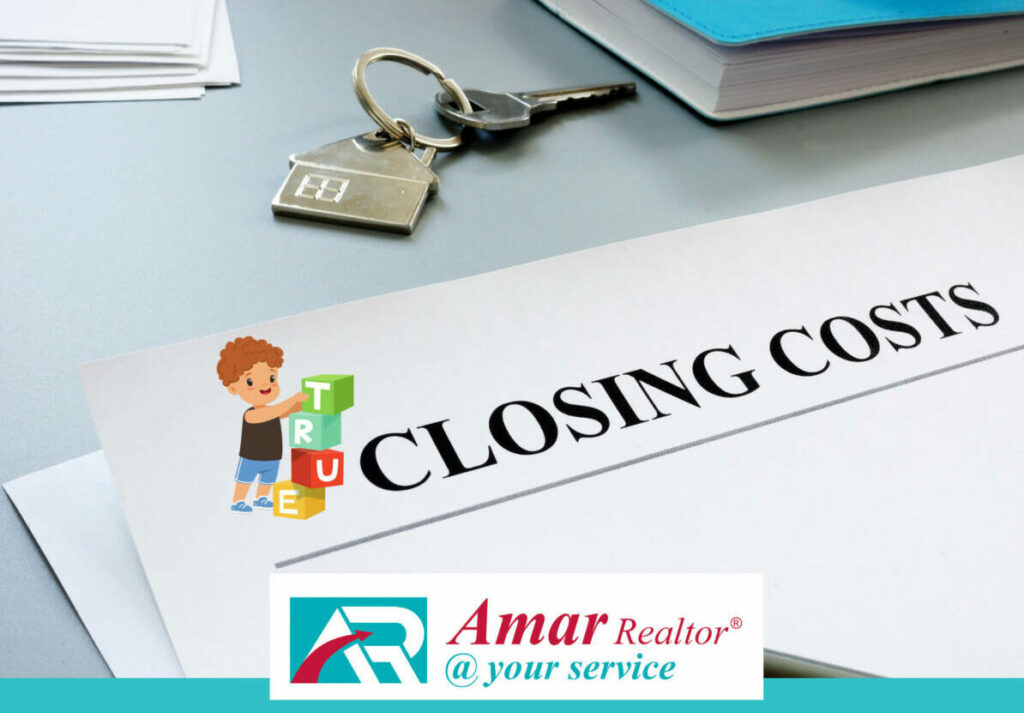by Amar REALTOR® | July 11, 2022 6:13 am
The True Cost of Closing on a Home
When buying or selling a home, knowing the costs associated with closing on the sale is important. These costs can add up quickly, so factoring them into your budget is important.
SaleThe true cost of closing on a home sale can vary widely depending on the final sales price, the type of mortgage loan you choose, and other factors. Use this closing costs calculator to estimate your total closing costs.
https://www.mortgagecalculator.org/calcs/net-seller-proceeds.php
Commissions
Commissions in real estate are fees charged by agents or brokers for their services in connection with a transaction. The commission is generally a percentage of the final sale price, and the seller pays it at closing.
Transfer tax
When you buy a piece of property, you may be subject to a transfer tax. This tax is generally levied by the state or local municipality in which the property is located and is based on the property’s sale price. The amount of the tax can vary widely. Hence, it is important to check with your real estate agent or attorney to determine the tax rate in your area. In most cases, the seller is responsible for paying the transfer tax.
Hence, it is important to check with your real estate agent or attorney to determine the tax rate in your area. In most cases, the seller is responsible for paying the transfer tax.
Still, there may be circumstances where the buyer is responsible for paying all or part of the tax. For example, if the property is purchased from a family member, the buyer may be required to pay the transfer tax. It is also important to note that some states exempt certain types of property from transfer taxes, so it is possible that you may not have to pay a transfer tax on your purchase.
Title insurance
When buying a home, title insurance is an important type of insurance to consider. Title insurance protects the buyer and lender if there are any property title problems. This can include undisclosed liens or encumbrances, errors in public records, or even forgery. If any of these problems arise, title insurance can help to cover the costs of rectifying the situation. In many cases, title insurance is required by lenders to protect their investments. However, even if it is not required, it can still provide peace of mind in knowing that you are protected against potential problems with your home’s title.
Escrow fees
When you buy or sell a house, the escrow company is a key player in the process. Escrow fees are paid to this neutral third party to hold on to important documents and funds related to the transaction. The most common type of escrow is the earnest money deposit, which the buyer pays to show they are serious about purchasing a home. In addition, escrow companies can also be responsible for handling things like home inspections and title searches.
While the exact fee will vary depending on the company and the services provided, it is typically a percentage of the total sale price. For example, if you buy a house for $200,000, you might expect to pay around $1,000 in escrow fees. While it may seem unnecessary, working with an escrow company can help ensure that everyone involved in the transaction is protected.
Prorated property taxes
When you purchase a home, you are responsible for paying property taxes. Property taxes are typically calculated based on your home’s value and area’s tax rate. However, your property taxes will be prorated if you purchase a home partway through the year. This means you will only be responsible for paying a portion of the annual tax bill based on the remaining months.
For example, suppose your yearly property tax bill is $1,000, and you purchase your home in May. In that case, you will be responsible for paying $500 in property taxes for the remainder of the year. Prorated property taxes can be a helpful way to budget for your new homeownership expenses.
HOA fees
When you purchase a home that is part of a homeowners association (HOA), you will be responsible for paying HOA fees. These fees go towards the upkeep common areas, such as swimming pools, tennis courts, and landscaping. In addition, HOA fees may also cover the cost of trash removal, security, and other services. The HOA fee will vary depending on the size and amenities of the community and the number of homes that are part of the HOA.
In some cases, HOA fees can be quite expensive, so it is important to factor them into your budget when considering the purchase of a home. However, many people believe that the benefits of living in a well-maintained community are worth the cost of the HOA fee.
City transfer tax
A city transfer tax is imposed by a city when the property is sold within its boundaries. The tax is generally based on a percentage of the sale price and is paid by the buyer. Sometimes, the seller may also be responsible for paying the tax. City transfer taxes can vary significantly from one municipality to another, so it’s important to know the tax rate in the city where you’re buying property.
The tax can add a high cost to your purchase, so be sure to factor it into your budget. Although city transfer taxes may seem unnecessary, they help fund important city services such as police and schools. Ultimately, deciding whether to pay a city transfer tax is up to the buyer. However, knowing the potential cost before making an offer on a property is important.
Loan origination fees
Lenders charge loan origination fees to cover the cost of processing a loan application and evaluating a borrower’s creditworthiness. Origination fees can range from 0.5% to 1% of the loan amount and are typically paid at closing. However, some lenders may allow borrowers to roll the fee into their loan balance, which means it will be financed over the life of the loan.
Origination fees are just one of many costs associated with a mortgage, and borrowers should shop around to compare total costs before deciding. While a low origination fee may seem like a good deal, it’s important to consider all the other expenses involved in taking out a loan before making a final decision.
Appraisal Fee
An appraisal fee is a charge the borrower pays to appraise the property by a licensed appraiser. The appraiser will estimate the property’s value, determining the loan amount. The appraisal fee is typically around $300, but it can vary depending on the location and type of property. Sometimes, the lender may require a second appraisal if they feel the first one was inaccurate. If you are considering buying a property, be sure to ask about any appraisal fees that may be required.
Closing costs vary for Buyers and Sellers.
When buying or selling a home, knowing the closing costs is important. Closing costs are fees paid at the closing of a real estate transaction, and they can vary depending on whether you’re the buyer or the seller.
Generally, buyers can expect to pay between 1% – 2% of the purchase price in closing costs, while sellers typically pay between 5% – 6%. However, several factors can affect these numbers, so it’s always best to consult a real estate professional to get an accurate estimate.
The buyers’ most common closing costs include loan origination fees, appraisal fees, and title insurance. For sellers, everyday prices include agent commissions, transfer taxes, and escrow fees. It’s also important to note that closing costs are typically paid in cash, so ensure you have enough saved up before you begin the process.
With a little planning and knowledge, you can avoid any surprises regarding closing costs. By understanding how they work and what to expect, you can keep your home-buying or selling experience as smooth and stress-free as possible.
Resources
https://www.makinghomeaffordable.gov/
https://apps.hud.gov/offices/hsg/sfh/hcc/hcs.cfm
https://www.consumerfinance.gov/complaint/
https://www.knowyouroptions.com/loanlookup
https://ww3.freddiemac.com/loanlookup/
To learn more details, let’s talk with Amar REALTOR®.
Let’s schedule a meeting with Amar REALTOR to review all your Real Estate objectives at a time that works for you.
 Please Click the link below to schedule a time on my online calendar!
Please Click the link below to schedule a time on my online calendar!
https://www.amarrealtor.com/meetingwithamarrealtor/
Contact Amar REALTOR® today for more information about Buying/Selling a Home in the Bay Area!
Amar REALTOR® offers expert real estate services with proven results in Bay Area Housing Market, including Homes for sale in Santa Clara County, San Mateo County, Contra Costa County, and Alameda County.
More Interesting Information about Bay-Area Real Estate
Bank-owned property or real estate-owned (REO)
What You Need to Know About Buying a Foreclosure Home
Source URL: https://www.amarrealtor.com/real-estate-news/closing-on-a-home/